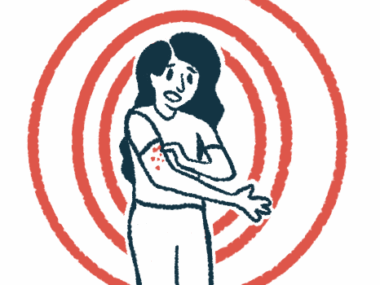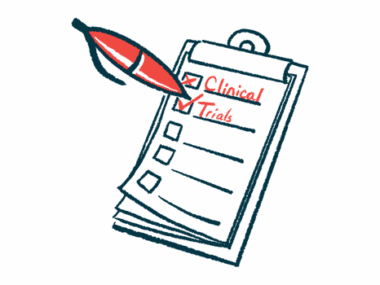Dosing starts in trial of topical treatment AGLE-102 for DEB lesions
Trial to evaluate safety, efficacy of therapy in 10 patients
Written by |

The first patient has been dosed in a clinical trial evaluating Aegle Therapeutics‘ AGLE-102, an investigational topical treatment for dystrophic epidermolysis bullosa (DEB).
The Phase 1/2a study (NCT04173650) is assessing the safety and efficacy of the therapy, applied topically to skin lesions, against a placebo in up to 10 people with DEB, ages 6 and older.
“We are thrilled to announce the initiation of this Phase 1/2a clinical trial for DEB,” Shelley Hartman, Aegle’s CEO, said in a company press release. “Aegle is committed to advancing new therapies to address the continued unmet medical need of this patient population.”
In DEB, mutations in the COL7A1 gene lead to faulty or absent type 7 collagen (COL7), a protein that connects and anchors different layers of the skin. Without COL7, the skin layers can separate, leading to blister formation and scarring as blisters heal.
AGLE-102 comprises tiny sacks of cellular components called extracellular vesicles (EVs) that contain proteins, nucleic acids (which include DNA and RNA), and other molecules derived from mesenchymal stem cells (MSCs), a type of stem cell found in bone marrow. Biomolecules within EVs have been shown to have anti-inflammatory, immunomodulating, and tissue-regenerating properties.
Treatment mimics body’s healing mechanism
EVs are collected from donor MSCs and isolated using a technology developed by Aegle to preserve their quality.
MSCs can become other cell types or regulate the activity of nearby cells, including boosting the production of COL7. In fact, preclinical research has demonstrated the potential of MSC-derived EVs to stimulate COL7 production in cells. AGLE-102 has been effective in healing burns, according to the company.
“AGLE-102 is designed to mimic the body’s healing mechanism by delivering proteins, including collagen 7, and other important biomolecules such as nucleic acids that act by reducing inflammation, modulating the immune system and inducing diseased cells to make their own collagen 7,” said Evangelos Badiavas, MD, PhD, chief scientific officer at Aegle.
The EV-based treatment received rare pediatric disease designation and fast-track status from the U.S. Food and Drug Administration. Such designations help speed the development of investigational medications for serious or life-threatening childhood diseases affecting fewer than 200,000 people in the U.S.
Aegle previously raised $4 million in funding for the clinical trial to test AGLE-102 and another $6.5 million in Series A financing to accelerate its clinical pipeline.
“AGLE-102 offers a unique, multifaceted approach to the treatment of DEB,” Badiavas said.






